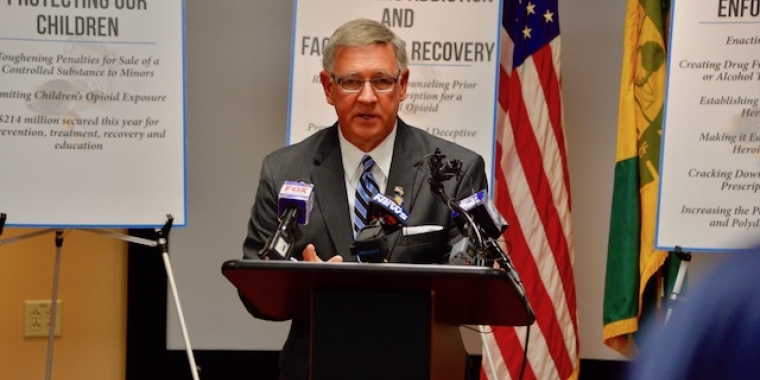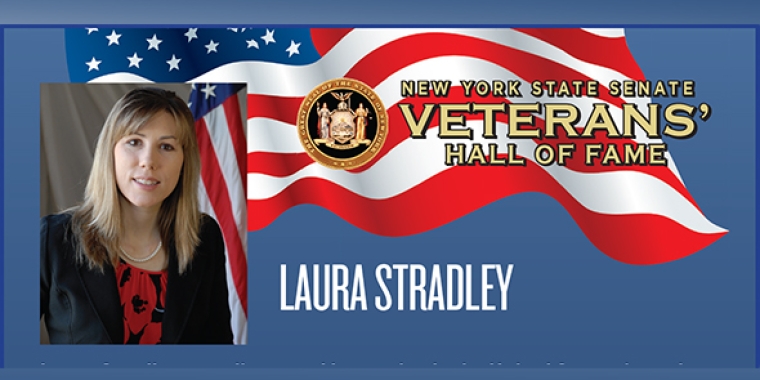
Funke, O'Flynn Call for Passage of New Laws to Combat the Heroin and Opioid Epidemic
August 14, 2017

Senator Rich Funke and Monroe County Sheriff Patrick O’Flynn called on the state legislature to pass in the next legislative session more than a dozen bills to help end the state’s deadly heroin, opioid, and synthetic drug epidemic.
The proposals include measures to expand enforcement and crack down on dealers, and are official recommendations of the Senate Joint Task Force on Heroin and Opioid Addiction, on which Funke serves. Each of the proposals passed the Senate this year with widespread bipartisan support; none advanced through the Assembly. To receive further consideration, all of the measures must be reintroduced in the next legislative session.
“With each passing day, heroin takes more lives, shatters more families, and makes our streets less safe. Since the stakes are so high, we must begin pushing Albany to adopt our Task Force recommendations to expand enforcement and crack down on dealers as soon as possible,” said Funke. “We secured over $200 million in state funding to support treatment and prevention this year, which is already helping to stem the tide of addiction. Now is the time for Albany to take the next steps and give our law enforcement partners, like Sheriff O’Flynn, the tools they need to take deadly drugs and dealers off of our streets, once and for all.”
“This sensible legislation will save lives and show our community that we are serious about fighting this epidemic,” said O’Flynn. “In Monroe County, we have been hard at work to root out heroin and opioids from our community.”
The proposals include:*
Strengthening Enforcement:
Enacting “Laree’s Law”: Bill S2761 would establish the crime of homicide by sale of an opiate controlled substance. Currently, a person who provides an illicit drug that results in the death of a user can typically only be charged with criminal sale of a controlled substance, allowing those involved in the illicit drug trade to escape prosecution for the deaths caused by their actions.
Creating Drug Free Zones Around Drug or Alcohol Treatment Centers: Bill S1127 would criminalize the sale of a controlled substance on the grounds of a drug or alcohol treatment center, or within 1,000 feet of such facilities. Statistics show that drug dealers often prey on individuals with addictions by sitting in the immediate vicinity of a drug or alcohol treatment center or methadone clinic waiting for people to come out so they can sell them drugs.
Establishing New Penalties for Heroin Sales: Bill S880 would create appropriate level penalties as it relates to heroin sales, taking into account the lighter weight of heroin. Heroin weighs less than other drugs and therefore more doses of heroin are needed to trigger various criminal offenses.
Making it Easier to Prosecute Heroin Dealers: Bill S638 would assist in the prosecution of heroin dealers by creating a presumption that the possession of 50 or more individual packages containing heroin and/or having an aggregate value of $300 is possession with intent to sell. Currently, dealers can carry large quantities of the drug before triggering a felony charge of possession.
Cracking Down on Black Market Prescription Drugs: Bill S2814 would establish the offense of fraudulent prescription, dispensing and procurement of non-controlled substance prescription medications and devices, and establish the offense of unlawful possession of non-controlled substance prescription medications and devices. The gaps in existing law and the growth of a black market make it self-evident that change is necessary. This bill will address the problem by increasing or establishing criminal penalties that better fit these crimes.
Increasing the Penalties for Heroin and Polydrug Offenses: Bill S2744 would increase the penalties for selling heroin, compounds that include heroin, and "polydrug" compounds that include heroin and another narcotic. Deadly polydrug combinations are gaining in popularity and to stop needless deaths, the bill strengthens penalties for heroin and polydrug offenses as an added disincentive for drug dealers.
Prohibiting Dangerous Synthetic Drugs:
Improving the Regulation of Fentanyl: Bill S5884 would add six new derivatives of fentanyl to the controlled substance schedule regulated by the state Department of Health. Fentanyl and fentanyl-combined drugs are a major driver of the many recent overdoses that have occurred across New York State. It is vital for public health and safety to properly regulate this potent drug.
Cracking Down on The Sale of Carfentanil: Bill S623 would make the sale of 2 milligrams or more of Carfentanil a Class A-II felony and the sale of 10 milligrams or more of Carfentanil a Class A-I felony. Carfentanil is synthetic opioid and a schedule II controlled substance, which is 100 times deadlier than fentanyl, and 10,000 times stronger than morphine.
Conforming State Controlled Substances With Federal Schedules: Bill S5357 would update the state controlled substances schedules, promoting consistency with the federal schedules and promoting health and safety. Consistency between the state and federal schedules is important to address the prevalence of abuse and misuse of controlled substances. The bill would also add other known dangerous substances to the state’s schedule of controlled substances, including a synthetic opioid analgesic, often is known as AH-7921, which can cause a deadly psychoactive reaction.
Protecting Children from Drug Abuse:
Toughening Penalties for Sale of a Controlled Substance to Minors: Bill S3845 would help curb rising drug abuse among high school students and other youth by making the sale of a controlled substance by an adult to a minor under the age of 14 a class A-II felony.
Limiting Children’s Opioid Exposure: Bill S5949 would address the increasing risk of children becoming addicted to opioids and heroin after being prescribed painkillers for medical procedures or illegally sharing extra prescriptions. The bill requires a health practitioner to receive written consent from a minor’s parent or legal guardian in order to prescribe a medical treatment containing opioids, as well as to discuss the risks of addiction and dangers of overdose associated with the medication. The bill also limits the prescription for a controlled substance containing an opioid to a seven-day duration unless there is a medical emergency that puts the child’s health or safety at risk.
Preventing Addiction and Facilitating Successful Recoveries:
Requiring Patient Counseling Prior to Issuing a Prescription for a Schedule II Opioid: Bill S5670 would require health care practitioners to consult with a patient regarding the quantity of an opioid prescription and the patient’s option to have the prescription written for a lower quantity. The physician must also inform the patient of the risks associated with taking an opiate medication, and the reason for issuing the medication must be documented in the patient’s medical record.
Preventing Predatory and Deceptive Substance Abuse Treatment: Bill S6544 would make it a crime to offer to or accept any kickback from an individual or entity that provides substance abuse services in exchange for patient referral and admission. There has been a rise in individuals who aggressively pursue people in need of substance use disorder treatment services and, for a sometimes-extravagant fee, promise admission to treatment programs. For individuals engaging in this predatory behavior, the most desirable patients are those with robust insurance coverage, and out-of-network benefit packages. Patient brokers refer these clients to programs offering the highest rate of "return" to the patient broker, with little or no regard for the patient's specific needs. This predatory practice capitalizes on, and exploits, families' fears while putting patients at risk of inappropriate treatment.
Expanding Access to Funding for State Substance Abuse Services: Bill S898 would authorize the state Office of Alcoholism and Substance Abuse Services (OASAS) to provide funding to substance use disorder and/or compulsive gambling programs operated by for profit agencies. Current statute states all funds issued by OASAS to provide addiction prevention, treatment and recovery services must be awarded to non-profit providers. For-profit organizations, which provide similar services are unable to apply for state contracts through OASAS and such restrictions limits competition within the RFP process that would ensure state dollars are being used in the most efficient way possible.
The state legislature is scheduled to reconvene in early January, 2018.
###
* Source: SENATE COMPLETES PASSAGE OF BILL PACKAGE THAT TAKES THE NEXT STEPS TO COMBAT STATEWIDE DRUG ABUSE, Wednesday, June 14, 2017 https://www.nysenate.gov/newsroom/press-releases/senate-completes-passage-bill-package-takes-next-steps-combat-statewide-drug
Share this Article or Press Release
Newsroom
Go to NewsroomLaura Stradley
May 19, 2015

